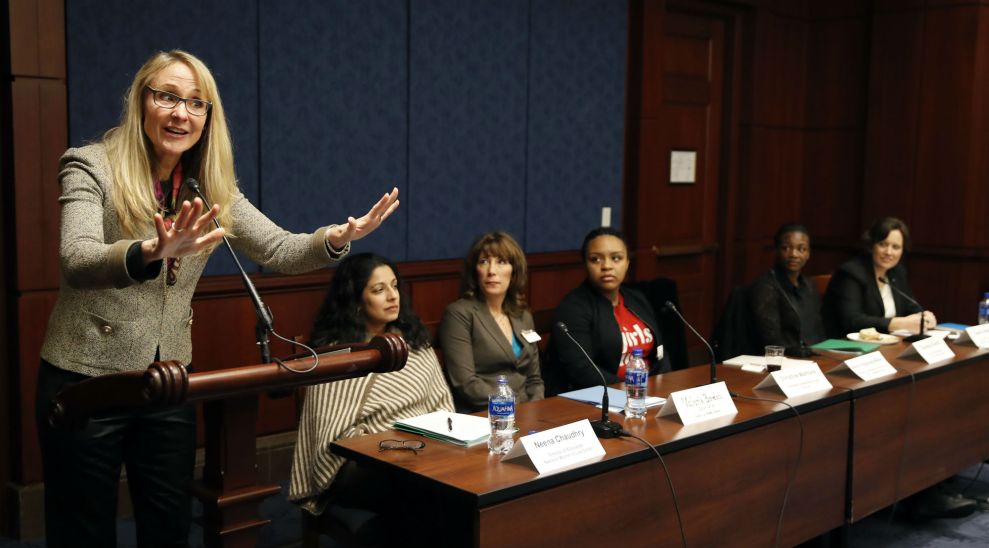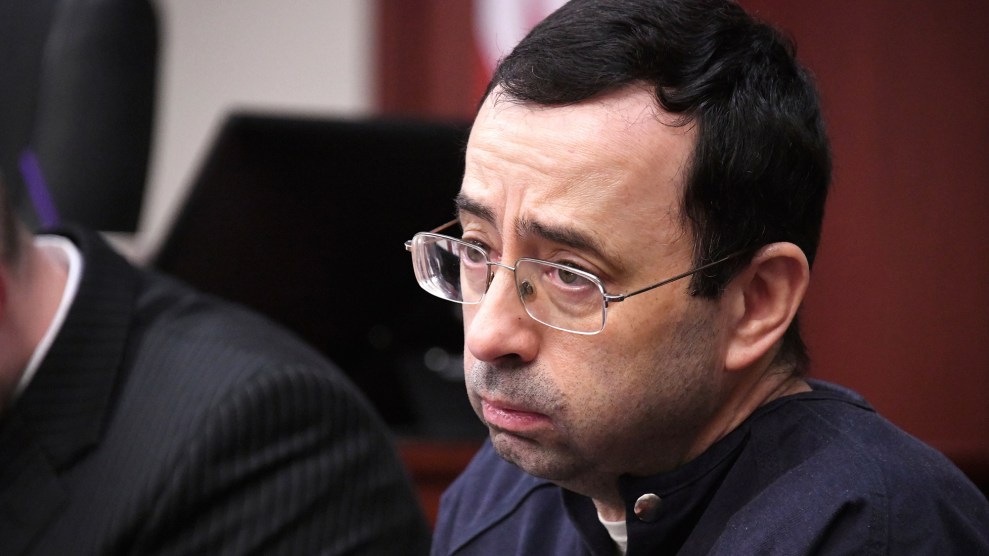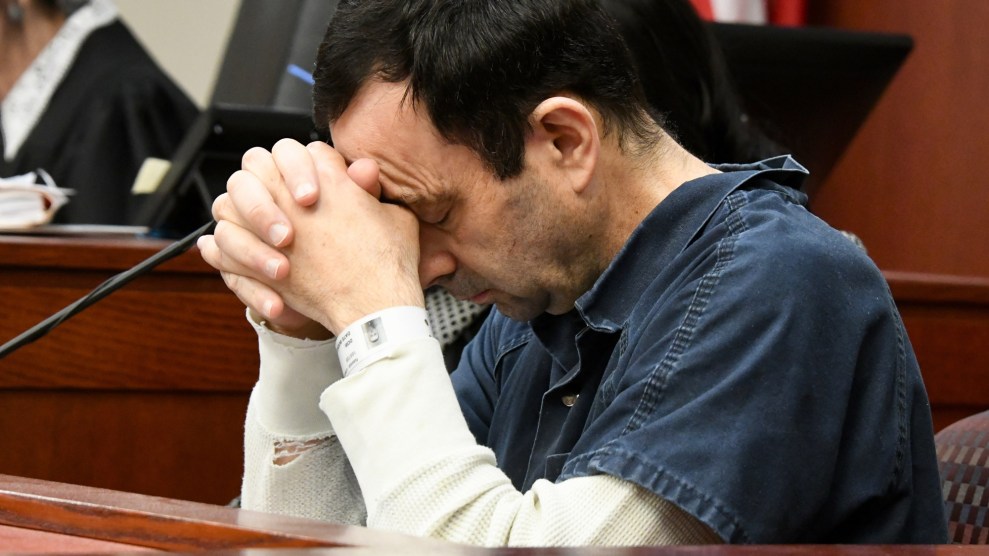
Nancy Hogshead-Makar, three-time Olympic swimming gold medalist, speaks during a media briefing to highlight the role of Title IX and commemorating the 32nd Annual National Girls & Women in Sports Day on Capitol Hill, Wednesday, Feb. 7, 2018 in Washington.Alex Brandon/AP Photo
When Indianapolis Star reporters began to break news that former USA Gymnastics doctor Larry Nassar abused more than 150 women, Nancy Hogshead-Makar met with them to explain how oversight of sexual abuse works in club and Olympic sports—basically, she said, there had long been very, very little. “Larry Nassar, or somebody like Larry Nassar, was inevitable,” Hogshead-Makar recently told Mother Jones. “By not imposing any child protection policies on youth sports, it’s inevitable that you’re going to have a monster that’s going to come out.”
“This is not new news,” she adds. Hogshead-Makar would know. A former competitive swimmer, she won three gold medals and one silver at the 1984 Olympics, making her one of the most decorated athletes in the sport at that year’s games. But a range of events, including her own experience surviving sexual assault in college, inspired Hogshead-Makar to leave swimming and begin what’s become her life’s mission: to make the playing field more equal, and safe, for female athletes.
Since graduating from Georgetown Law in the late ’90s, she has worked within schools and universities to make their policies more consistent with Title IX and has led the Women’s Sports Foundation, an advocacy organization focused on equality for women in sports. Now the head of her own legal advocacy group, Champion Women, one of Hogshead-Makar’s most recent projects has been helping build the US Center for SafeSport, an independent entity which can investigate and sanction coaches and members of the US Olympic Committee. She was one of the leaders behind the bill that President Trump signed into law last week, which authorizes the center and codifies a range of procedures that protect Olympic and club athletes from sexual abuse. Under the bill, members of the Olympic movement and youth sports have, for the first time, a legal duty to protect athletes from abuse, as well as a legal requirement to report suspected child abuse.
Mother Jones recently caught up with Hogshead-Makar to talk about how beating male swimmers helped push her to pursue law, the dangerous differences between swimming and gymnastics, and how the Larry Nassar case will—or won’t—change the landscape.
Mother Jones: After competing in the Olympics, why did you decide to become a lawyer and an advocate for women in sports?
Nancy Hogshead-Makar: I was always interested in gender. Today, if you look at me or Google me, I totally look female. There’s no question whatsoever. But when I was growing up, I could not gender conform. I had this unusual propensity to put on muscle and I started hearing these crazy things when I was 12 years old, like: I wouldn’t want to be caught in a dark alley with you. I’d be walking into a bathroom, and somebody would say, Hey, that sign says women!
And I swam fast in practice. Swimming is a co-ed sport and frequently I’d be beating the guys. When I was pretty young, my coach one time said [to a male swimmer], “Hey, I can’t believe you let a girl beat you!” I pulled him aside and said, “Look, you’re making both of our lives miserable. You have to respect both of us. We’re teammates. We’re both trying to get the same thing, but just to be the best athletes we can be.” To his credit, he never said it again. After that, I was better at sort of talking to people about that.
Fast forward, and I was sexually assaulted when I was in college and it was brutal. It was physical, it was demeaning, and it changed the course of my life. I never thought something like that could happen to somebody like me. I was smart, I was hard working. [It made me] realize that I personally could not achieve out of sexism. In other words, whatever people thought about females, they were going to think that about me—no matter what I did, no matter how much I accomplished.
I had this click and I started taking classes in women’s studies. So I went from sports, which is all about celebrating masculinity and masculine traits, into women’s studies. I knew about then that I wanted to be an attorney.
I also realized around then how much I owe to [Title IX]. I never would’ve gotten a college scholarship if it hadn’t been for Title IX. So I started talking about the statute, and when I went to law school, I started off mostly doing Title IX athletics work. But because of all of the things that had happened with sexual violence in college, I sort of shifted toward that as well. So by the time [then-University of Colorado student] Lisa Simpson was sexually assaulted by a football recruit in the early 2000s, the plaintiff‘s lawyers and defense’s lawyers had to find somebody that would come in and be the Title IX advocate for the school. That was me. I worked with the University of Colorado for five years. I really got to see a school system inside and out and help them design policies to be more consistent with Title IX.
MJ: What was the oversight like with Olympic programs?
NHM: Olympic programs were doing virtually nothing about [sexual abuse happening in sports]. When I say nothing, what I mean is: Schools clearly have a legal duty that extends to the kids. They have an obligation to predict and prevent abuse. If they don’t do that well, the legal standard is kind of high. If the school remains “deliberately indifferent” to actual knowledge of sexual harassment and abuse, then they’re liable. So it means schools have to react, [like in the case of] Lisa Simpson.
So I did all this work with schools first and kind of got a playbook. And then all of a sudden somebody would call me from this club [or] Olympic sport, and there was nothing in place [to protect athletes]. There was no recourse that the athlete had. There was nobody to sue, there was no insurance, and there was no accountability. I was like, Well, I’m an Olympian. Let me try to work within the Olympic Committee. So I worked for roughly seven years, from around 2010 until now, within the Olympic Committee. I wrote a ton of policy and legal memos for them. And I realized that it wasn’t really working. The Olympic Committee and National Governing Bodies, the entities that oversee the specific sport, knew that the strategy they were pursuing was dangerous to young children and they pursued it anyway. It wasn’t that they didn’t know, it was that they didn’t want to know. So that’s when I started speaking out to the media and when I started my organization, Champion Women, which provides legal advocacy for girls and women in sports to help them be more effective.
MJ: You spent seven years working to create the US Center for SafeSport, an independent entity that has the power to investigate and sanction members of the Olympic Committee. And recently you were fighting for the Protecting Young Victims from Sexual Abuse and Safe Sport Authorization Act. Could you walk me through what the bill does?
NHM: So number one, the bill gives the Olympic committee a legal duty [to protect athletes from abuse]. All of these things could have been done by the Olympic committee before; they already have the authority to do this by themselves, but they didn’t have the guts to do it. Number two, it says that adults and children cannot be alone together without it being in an observable and interruptible distance.
It also says that people need to report if they suspect child abuse, not if they know there’s child abuse. One of the things that we need to make sure that we educate people on is that they don’t need to do their own investigation. In fact, they shouldn’t do their own investigation. Interviewing a child requires special expertise. You tell the child protective services, the FBI, or the local police and let them take it from there. That’s new. Most clubs heretofore have said, We don’t want the bad PR. We just want this molester to go away. Now if a club does that, the club owner could end up in prison for violating a federal statute. They no longer have the option of kicking the can. Finally, it extends the statute of limitations, which is now 10 years.
MJ: How has the Nassar case affected your work?
NHM: A Larry Nassar-type moment is a teachable moment. The difference between school sexual abuses and club and Olympic sexual abuses is just night and day. Someone who gets abused who is part of a school, I can call the general counsel and of course they have insurance, they have protocols in place; you either violated those protocols or you didn’t. It happens at a club, there is no general counsel, they don’t have insurance, and they don’t have general policy.
When we were trying to get Rick Butler, the Amateur Athletic Union coach in Aurora, Illinois, out of volleyball [after allegations of misconduct], I wrote to schools with a dossier of evidence that he sexually abused girls. The school would respond from the general counsel’s office, and say, Thank you very much for this information, this is very helpful, and he will never be associated with our school again. When I wrote to a club, with the exact same information, they would say, How dare you interfere with my business relationship. And you’re harassing me. If you keep going, I’m going to call the police.
So the only thing that’s different about Larry Nassar is the scale—for one person to be able to abuse that many people. But we already had hundreds of cases before this. Just the heat did not get hot enough for the Olympic Committee to change its ways. You can’t just populate the United States Gymnastics and the United States Olympic Committee with more of the same type of people [who are] all concerned about their own legal liability or really have no regard for the interests of athletes.
MJ: A number of high level officials have resigned as a result of the Nassar case and efforts are being waged to get others out. But that’s only one part of changing the culture of an institution. What are the next steps, beyond forcing high level officials to resign?’
NHM: What makes a swimmer vulnerable to sexual abuse is very different from what makes a gymnast vulnerable to sexual abuse. Every sport still needs to figure that out. Gymnasts have to be liked by their coach and there’s a huge subjective component to that. For swimmers, that doesn’t matter at all. In swimming, there’s a culture of coaches dating athletes. I don’t hear so much about romantic and sexual relationships between coaches and athletes in gymnastics. I hear [instead] about this very elicit abuse of coaches saying, If you want to be great, you have to do everything I want you to, including…
Moving forward, it’s figuring out what are the danger zones for all the sports.
Ideally, how do you prevent sexual abuse? You want to have the coach be the one who’s enthusiastically [setting standards], saying to kids, six and eight and ten year olds, I will never do that, and no good coach will ever do that, and someone does that, they’re an unethical coach. And here’s who you should go tell. You want the coach to say what they can expect from a coach’s behavior for the rest of their athletic careers and to say, I as a coach will never give you a present. I will never be alone with you. I will never close the door. I will never be friends with you on social media. I will never text just you. I will always include your parents or it will be a team text. This takes a coach and a club and a system that is fully onboard with child protection measures and enthusiastically embracing them.
MJ: What kind of gender imbalances have you been noticing in the current Olympic games?
NHM: The Tucker Center for Research on Girls and Women in Sport is tracking how much [female Olympic athletes] are being covered in the media. A notification I got during the first week of the Olympics said women only had [about] five percent of the media coverage, which is unusual.
As far as participation, there’s a little ways to go. Women are something like 46 percent of the athletes at the Winter Olympic Games, but the National Olympic Committees are almost all male and the coaching staff is almost all male. So the leadership and the economic opportunities around this thing called Olympic sports goes to primarily men.
MJ: Do you have advice to aspiring young Olympians?
NHM: I encourage people, in general, to have the high goals. Because just pursuing something with a high goal that may seem unattainable will make you a better person and transform who you are. Like, come on, I had this goal of trying to remedy sexual abuse in club and Olympic sports affecting up to 60 million people. That was eight years ago. And we just got a statue last week. For a long time it really looked impossible to achieve something big. And every time someone says, Nancy, way to go, you got a statute passed!, I burst into tears. I still can’t believe it.
MJ: Do you have any advice to add for young women athletes, in particular?
NHM: I think it helps when you recognize that there’s no way that you can twist your life or the way you live your life so that you don’t experience sexism or sexual harassment or sexual abuse. Because when you can recognize that, when somebody tells you that you’re not going to get married, or that you are unattractive, or that you’re too ambitious, it’s just water off a duck’s back. You’re like: And that’s what it’s like being a woman in America. It’s not you. It’s not personal. In some ways, for me, that’s empowering. So when someone does say something that’s offensive, I’m not going to change how I live my life or who I love or who I surround myself with. I’m not going to change me because I bumped up against sexism in America.
This interview has been condensed and edited for clarity.












